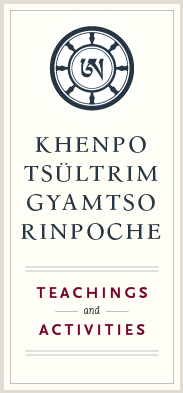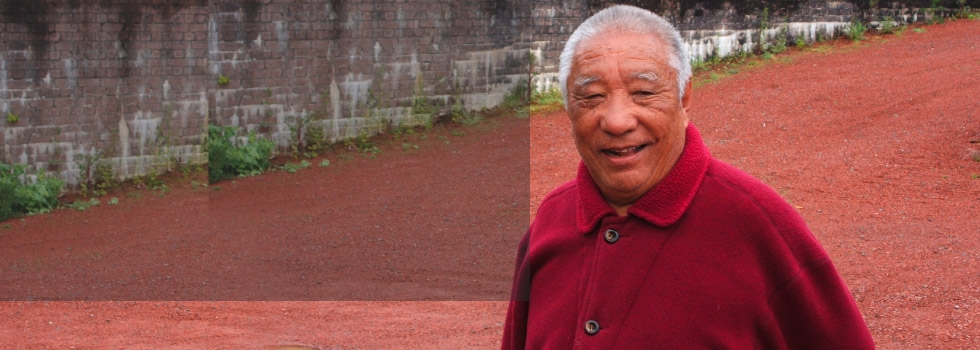You are here
Suddenly Remembering Dzogchen
From the palace of Dzogchen – appearing emptiness
I look out, and what I see
Is appearances in all varieties
And I suddenly remember that appearances
And their emptiness are inseparable
And there’s a reason why I remember this
It’s that the unexamined mere appearances
Provided through interdependence
When analyzed, have no makeup
And because they’re nothing solid from the start
I know from that that appearances
And their emptiness are inseparable
From the palace of Dzogchen – appearing emptiness
I look inwards and what I see
It’s my own mind I’m looking at
And I suddenly remember that the clarity
And its emptiness are inseparable
And there’s a reason why I remember this
It’s because the clear awareness which is mind
When analyzed, does not arise or cease
And thinking it to not exist is freed on the spot
And so it’s sure that the clarity
And its emptiness are inseparable
From the palace of Dzogchen – appearing emptiness
I look back into my mind
And what I see is “clinging to me”
And I suddenly remember that there is no self
In what I think is me or I think is mine
And there’s a reason why I remember this
It’s because none of the skandhas are a self
And because there is no self apart from them
I know for sure that from the very start
There’s never been any self at all
From the palace of Dzogchen – appearing emptiness
I look out and what I see
Is perceived and perceiver as a duality
And I suddenly remember the emptiness
Of perceived, perceiver duality
And there’s a reason why I remember this
It’s because the objects are mental habits’ tricks
And because none of these has a content of their own
And because the perceiving mind lacks a makeup too
And so it’s sure that reality
Is empty of all duality
From the palace of Dzogchen – appearing emptiness
I take a good look at samsara
And I take a good look at nirvana
And I suddenly remember great emptiness
Their emptiness of true existence
And there’s a reason why I remember this
It’s because they’re beyond being one and many too
And so I know great emptiness
And what it’s like is spaciousness
From the palace of Dzogchen – appearing emptiness
I take a good look at phenomena
I analyze the conventional world
And I suddenly remember the overview
That’s totally free from any kind of extreme
And there’s a reason why I remember this
Since “existing” or “not” are just comparative terms
And traits and their terms are dependent on each other
And so I know that the nature that lasts
Is totally free of complications
From the palace of Dzogchen – appearing emptiness
I look inwards and what I see
Is the very present moment of mind right now
And I suddenly remember the clear light
Totally free of the slightest flaw
And there’s a reason why I remember this
It’s because there is no flaw in the natural state
And because any flaw is empty of itself
I’ve settled down in the clear light
That’s free of flaw from the very start
From the palace of Dzogchen – appearing emptiness
I gaze inwards and what I see
Is self-arisen awareness
And I suddenly remember that awareness
And its emptiness are inseparable
And there’s a reason why I remember this
It’s because this inexpressible awareness
Transcending mental operations
Is the alpha-pure abiding nature of mind
And also because of its spontaneous presence
I realize that awareness
And its emptiness are inseparable
From the palace of Dzogchen – appearing emptiness
I catch my mind in the act
There’s lots of passion there – you know – the clinging kind
And I suddenly remember that even bliss
And its emptiness are inseparable
And there’s a reason why I remember this
It’s because the experience of bliss and emptiness
Comes in the four steps
Of joy and joy supreme and special joy and coemergent joy
And so I realize bliss and emptiness
The lasting nature of pleasure and pain
These nine occasions were spoken by Dechen Rangdrol to Dzogchen Ponlob Rinpoche who immediately wrote it down, August 16th. 1998.
Translated and arranged by Jim Scott, October 2010, Warsaw, Poland.Translation copyright 2012, Jim Scott

